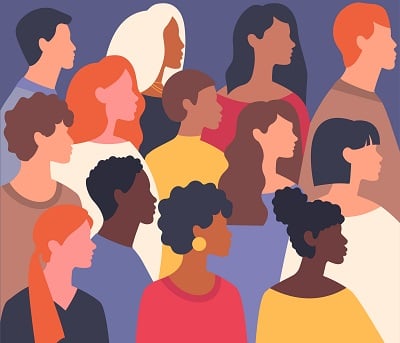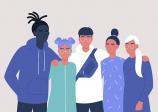BIPOC Mental Health Trends and Disparities
BIPOC Mental Health Trends and Disparities

Many members of BIPOC communities deal with stress and trauma that can stem from specific socioeconomic struggles that consciously and subconsciously impact the everyday lives of the community. A 2021 report by HHS cites “persistent systemic social inequities and discrimination” that worsen stress and associated mental health concerns for people of color during the COVID-19 pandemic (2). Even though mental health experiences are unique to each person, there are a few trends within the BIPOC community that highlight similar disparities and barriers throughout each ethnic group.
Stigmas
Many people within these communities deal with the reality of mental health being stigmatized and not fully embraced. These negative stigmas can make it difficult for others to feel comfortable discussing and exploring personal feelings or experiences. Because these communities have had to historically overcome adversities such as slavery or colonization, it is often expected that one should address issues such as anxiety and depression with resilience and perseverance. Even though there have been continued strides to destigmatize mental health, there is still a lot of work to be done within the BIPOC communities.
Racism
Racism has been a part of the nation’s history and legacy since its origin and continues to impact generations of various ethnic groups. Even though people can experience mental health conditions regardless of race, gender, identity or ethnicity, racism and discrimination can make it more difficult to receive the appropriate mental health care. Racism can also often result in feelings of dehumanization which can negatively impact one’s mental health. BIPOC and Indigenous communities have been uprooted from their land and often denied basic human services from the government. In addition, people of color do not have to directly experience racism to experience mental health struggles. Sometimes, just witnessing or hearing about racism and race-based violence can negatively impact one’s mental health.
Language and Cultural Differences
Communication is important when seeking out and receiving mental health care. Differences in language and cultural beliefs can make a huge difference in the quality of care provided. It can be frustrating trying to communicate or understand various medical and mental health terms that are not a familiar part of your cultural background. In addition, terms like “anxiety and depression” do not always translate well in other languages. More specifically, in the Native and Indigenous communities, the words “depressed” and “anxious” are absent from some native languages but other expressions such as “ghost sickness” or “heartbreak syndrome” are used. Additionally, cultural differences can be difficult to manage if the person or provider is unfamiliar with specific cultural norms. Therefore, representation and cultural competence are needed.
Need For Diverse Providers Who Practice Cultural Competence
There is an overall lack of representation and diversity among mental health providers in the United States. Having providers that are a part of BIPOC communities is essential in providing patients with an empathetic understanding of their unique experiences. Without those ethnic and cultural understandings, providers may underestimate how the effects of being a member of the BIPOC community can influence one’s mental health. This can impact the quality of treatment. In hopes of closing the gap between diverse providers and the BIPOC communities they serve, many people are looking for providers to have cultural competence training. When providers begin to explore and understand how cultural identity and intersectionality factor into providing the best level of care, then more people will feel comfortable seeking out care.
Lack of Access and Care and Treatment
Despite the obvious need for mental health care and support, systematic racism and discrimination have caused a lack of access to care and treatment throughout BIPOC communities. For example, poverty and unemployment are often a direct result of racial bias and discrimination and in turn lead to several challenges including lack of health insurance, limited availability of providers, lack of transportation to therapy appointments, and the full spectrum of mental illnesses that result from living in poverty (1). All of these factors underscore that the lack of access has a direct impact on the mental health needs of the community.
The true test of mental health equity will be achieved when all people -regardless of their cultural background - have the opportunity to attain their full health potential, and no one is impeded from doing so because of socially determined circumstances. Even though BIPOC communities continue to fight against systematic disadvantages and mental health disparities, a major solution to increase support lies with representation among professionals and culturally conscious treatment.
Share Your Story and Voice and Help #breakthestigma Around Mental Health.
Support ADAA's Mission - Every Gift Makes an Impact
Footnotes:
- American Counseling Association (ACA). www.counseling.org. July Is BIPOC Mental Health Month.
- Resources to Recover (RTOR). www.rtor.org. Black, Indigenous, and People of Color (BIPOC) Mental Health Fact Sheet.
















